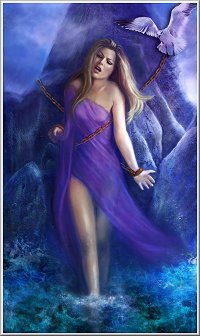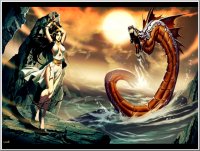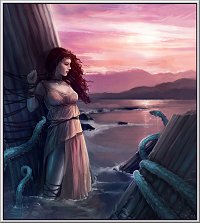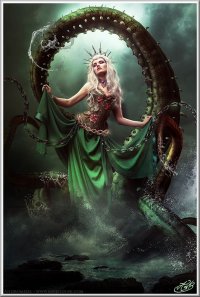
ANDROMEDA By Cemac
CLICK TO ENLARGE

CLICK TO ENLARGE

CLICK TO ENLARGE

CLICK TO ENLARGE
|
Beautiful Andromeda was a young Princess of Ethiopia, beloved daughter
of King Cepheus and Queen Cassiopeia. Her beauty was unsurpassed
in the kingdom and many were those suitors who dreamed of having her as
their wife, including her uncle Phineus, to whom she had been
promised while still a child.
The people of the kingdom were happy and productive, for the soil was fertile and
the crops plentiful, peace was upon the land, and the sea
provided the rest.
Indeed they seemed blessed by the Olympian gods. But the good
times weren't going to last.
Andromeda's vain mother, Queen Cassiopeia, started to believe
that the kingdom's good fortune was a result of the inspired
and benevolent leadership of herself and her King, not due to
the kindness and magnanimity of the Olympian gods.
"We are here and now, real flesh and blood!" she would say. "The
gods are nowhere to be seen!"
That's called 'hubris' - an overweening pride in one's
own
accomplishments, which often leads to the tragic downfall of the offender. Many characters in mythology had found a sudden death,
or similar catastrophic fates, as a result of their hubris.
They had dared to compare themselves to the gods, and their
punishment was often swift and severe! The gods were not to be
trifled with - Cassiopeia was about to find that out.
Becoming quite full of herself, and obviously not mindful of
the consequences, Cassiopeia saw fit to further offend
the gods by boasting that the young maiden, her precious
daughter Andromeda, was more beautiful
than the Nereids, who were the daughters of the sea gods Nereus and
Doris.
The ancient Greeks regarded the Nereids as marine nymphs of the
Mediterranean Sea, lovely divinities that took delight in aiding
sailors in distress. They had proved particularly helpful to Jason
and his crew of Argonauts, while those voyagers were engaged in retrieving
the priceless Golden Fleece from Colchis.
There were reported to be fifty of
them, each one a ravishing beauty, although the number of Nereids varies among writers.
The Nereids resided with their father in their dwellings under the sea
and they were worshipped at various places throughout ancient
Greece, particularly - and understandably so - around sea port
towns such as Cardamyle and on the Isthmus of Corinth.
Poseidon, god of the seas, in his wrath sent a sea monster named Cetus to ravage the land of Ethiopia as divine punishment.
He had been told of Cassiopeia's foolish bragging and was
furious at the conceited woman.
The Nereids existed joyfully within the sea god's domain, and
Poseidon
was quite fond of them. Very often the fifty stunning nymphs
would escort him as he cavorted about the seas, and what a
marvelous sight it was to behold!
Poseidon was not about to have his beloved Nereids impudently disrespected by a mere
mortal. Vain Queen Cassiopeia must be taught a lesson! Bring on Cetus!
Andromeda's mother must have been truly mad, boasting that her mortal
daughter, however beautiful, was prettier than the nymphs of the
sea. Poseidon would not suffer such an insult to his
Nereids.
As the sea monster wreaked havoc and destruction everywhere, the desperate king
assembled his wisest advisors. The oracles declared that the
kingdom would only be spared if innocent Princess Andromeda were to be
sacrificed to the creature Cetus.
Since it was Andromeda's beauty that had aroused her mother's
conceit, only her death would appease
Poseidon, and rectify the Queen's ill-advised insult to the Nereids.
Even though Andromeda was an innocent and unwilling participant in this
Greek tragedy, it appeared that her role was the one that would suffer
the most, at the mercy of the sea monster Cetus.
Her parents felt as if they had no choice. For the sake of the kingdom and
with hearts heavy, Andromeda was chained
helpless to the rocks to await Cetus.
But, just as the sea-monster was about to
make quick lunch of her, the hero Perseus chanced to fly by on the
wondrous winged horse Pegasus.
Talk about great timing! Not a moment too soon!
Perseus had just returned from slaying the putrid Gorgon called
Medusa, a hideous beast with hissing snakes for hair. She was so
foul that a mere glance from her would petrify anyone unlucky
enough to gaze upon her, and at once they would turn to stone.
Medusa had not always been a hideous monster; truth be told she
once was a ravishing beauty herself, but through no fault of her
own she had been transformed by the gods into the reviled beast. However,
that's a story for another time.
Many a hero had met their sudden demise at Medusa's stare, and
their petrified corpses littered her stinky lair, but Perseus had
divine help. Our hero was prepared for battle!
(continued on Andromeda Page Two
- Sweet ending!) |








